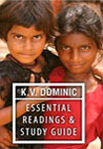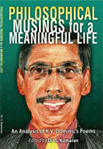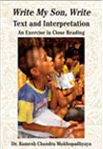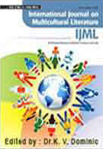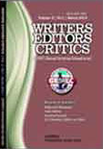Books Review in Detail
Review Of PCK Prem’s article on K. V. Dominic’s Winged Reason
Pck Prem On Winged Reason
K. V. Dominic’s Winged Reason:
Poems of Man’s Earthly Life and Painful Realities
P C K Prem
(Appeared in Labyrinth 2.2 (April 2011)
K. V. DOMINIC is a poet, critic, editor and short story writer who has published nine books so far. His research papers on Rabindranath Tagore and R. K. Narayan are notably insightful. He is one of the finest scholars we have and he is on the Advisory Boards of many journals and is also a co-editor of the international refereed journals Writers Editors Critics and New Fiction Journal. He has been the Chief Editor of Indian Journal of Postcolonial Literatures since 2000.
Winged Reason is a collection of poems of earthly imagination. Lofty thoughts and ideals are not areas obviously it looks but deep down Dominic conveys anxieties of human life. Dominic’s poetry is a document of social concerns in lyrics, beautiful and rhythmic. Winged Reason enshrines a definite message. Perhaps it is a rare collection of poems in Indian English Poetry that is realistic. Here, the words with the tonal values do not distract with multi-faceted meanings. The poet believes in simple, straight and plain language while showing genuine anxiety for socially neglected segments of society.
He is ruefully conscious of the rampant corruption whether political or religious. Whatever concerns man’s life, living and society is the theme of his poetic creation with minimum use of simile, metaphors and images. In a long preface, the poet makes a statement about poetic morality, theme and philosophy of life in totality while underlining the miserable conditions of the poor. Each poem exhibits invisible and disregarded existence of obtrusively stark realities of hard working poor people, and the sheer obscurity they confront around; and this challenges a sensitive mind while leaving a powerful and enduring impact and here lies poems’ beauty and strength.
Dominic is profoundly conscious of the hiatus between the rich and poor; and the degree of bias and exploitation governing the life of the poor. He, with aching intensity experiences the agonies and sufferings of women, old men and the downtrodden, as if. To him rural life is ideal, simple and innocent where no evil ever enters but urbanites are cruel and unsympathetic, materialistic and avaricious. In fact, life without philosophic nuances is the subject matter of Dominic’s poems and through objective and realistic social evaluation if efforts are sincerely made, man’s life can be meaningful, the poet asserts.
Dominic is a poet of humanity and speaks of man and society. His compassion is concentrated on man. His humanism is patently perceptible, when one goes into the lyrics’ emotional areas. This journey into the heart of the poems is an experience of stillness, terrific eruption of feelings, volatile stirring of suppressed emotions, and subdued but sublime creation of a loving and rich world. Here, the poet does not take the reader to the regions beyond sky or probes into the depths of heart. He is also not worried about the other world. The idea of love, birth and death do not worry. But, what occupies the entire intellectual strength and physical borders of the capacity of Dominic is the explored and still to be explored dimensions of man’s worldly needs.
His experiments with multifaceted experiences drive him to the heart of the society where man lives, flourishes, suffers and intellectualizes life and this truth in little fragments is revealed through indefinite mystery. Bereft of philosophic undercurrent, poems are greatly subjective but with an objective outlook. He interprets life from experiences gathered after conscious understanding of man. Many poems, indirectly deal with societal set-up and man’s behaviour and attitude in a collective endeavour to make society better. Poor’s miserable living conditions disturb the poet and he tries to hold the rich responsible for the sufferings of the downtrodden and here an attempt is made to look at issues in the contemporary context and relevance. The poet says, “Poor people are strangled through taxes and their governments do nothing for their welfare. The government is always with the rich, caring for their comfort and luxury. The rich can evade taxes; exploit the weaker sections; torture and kill anyone they like; they get the protection of police; can escape legal punishments . . . . It is the duty of the rich as well as the developed countries to alleviate the miseries of the poor.” Thus, the collection is a social document.
Worries of bread and shelter disturb and lead the poet to a calculated criticism of society. It is a personal indictment of the rich who he observes morally responsible for the injustice perpetrated on the poor and helpless. The injustice and poverty are the recurring themes of his poems while he does talk scathingly of the dirty politics and degeneration of value-system. Interestingly, in simple words with straight meaning the poets underlines an inherent irony. At times, the poet appeals to mankind to look below and ameliorate the pitiable conditions of the ignored segment.
It is predicament of the poet that despite a genuine desire to alleviate the sufferings of the poor, he is unable to translate sublime thoughts to reality of life. Squalor and extreme deprivation appear to hurt not only the poor man’s soul but it is physically torturing, the poet says. Genuinely thinking of the poor, he goes through a nightmarish experience of unrelenting anguish. In straight words like “an obese boy” and “a bony child” he vividly describes prevailing hunger and nauseating richness. In “A Nightmare,” he tells poetically of a wedding feast, ragged girls, garbage bin, and public school; and this intrinsic agony simply upsets. Even in sleep the poet feels the heat of these words and the pictures he conjures up are a commentary on the poor man’s life.
Tears streamed down my cheeks
I could see nothing more;
Nor did I wish for it;
The siren sounded as usual
To disturb my nightmare!
(“A Nightmare,” Winged Reason 23)
In “Harvest Feast” the poet hints at an effective education system which can serve the country better. In vociferous words he exhorts that coming generation if imparted education in agricultural related activities, it can definitely make a dent in the perennial shortages of essential commodities and food grains. If dignity of labour finds favour, mankind will be happy, he observes.
Their teachers taught them the great lessons:
how education can be vocational;
and the beauty and dignity of labour;
a lesson too to the adult world:
the way to solve the food crisis,
and save the world from poverty.
(“Harvest Feast,” Winged Reason 35)
The poet’s tries to draw parallels and comparisons here and there and does not falter. The words like- obese, bony and wedding feast need to be deeply understood. It is a commentary on the present day deplorable scarcity of food grains or lopsided allotment system through controlled channels. It is also a reflection on the government apathy in the handling of surplus food grains. It is often claimed that there is no scarcity of food items but the masses are not properly fed or are deprived. It is an appalling parallelism between the rich and the poor and ironically it is happening in a country where moral values are often much flaunted. In “A Nightmare” the poet is extremely sarcastic where emotions of pathos disturb a sensitive heart. A hint at queues speaks more that what the words say.
For the poet the sufferings determine the fate of the poor, who work hard but get nothing. Man’s life is seen from different perspectives. Each incident observed around is infused with meaning and this shows poet’s inherent strength to generalize logically. The insightful and empathetic mind and heart of the poet connect the sentiments and thoughts with humanity. Nothing escapes his ardently vigilant eyes. He views man from various thought-processes but the sardonic indictment remains an inseparable part of poet’s anxiety. The poet philosophically laments that the creator never had thought of any division among men. Whatever disintegrating factors there are, these have been created for serving self-interests. Nature feeds all but man eats up even nature and crafts a vacuum, a disruption in the perennial flow of life and thus the very oxygen of life is exhausted. If man has done magnificently well, he is equally destructive. Despite lofty achievements, millions are dying of hunger and it appears strange phenomenon but murderous truth. Poets’ painful regret is that division is injustice and here he gives bent to his socialistic thoughts with sarcastic parallels. Perhaps the poet has in mind the great divide man is attempting to bring about in the society by splitting it into not only classes but castes, religious sects and regional and fissiparous tendencies predominating the society and man.
But power corrupted
leaders turned tyrant;
the philosophy failed.
Equality to man utopian.
Capitalism rules the day;
Have-nots number swell.
(“Haves and Have-nots,” Winged Reason 36)
This thought horrifies as the revealed truth frightens man when the poet further says, “Shattered and smashed / are their dreams / of health and happiness.” Irony hurts as even plants and animals do not behave in partisan’s manner, the poet avers. The poet is an inveterate advocate of workers and “Lal Salaam to Labours” is tribute to the workers. It is because of the workers than society lives and survives. The working class makes humanity happy. Excitement is apparent when he praises workers. It is an emotional outburst which also highlights socialistic thought and ideology, the poet espouses. It is a communistic philosophy, he appears to advocate with the precise dictum that only workers are the backbone of society.
Let us not be unjust
When we pay them wages,
for we can’t do what they do
Give them at least their due;
the more we give the more we get;
Put charity in humanity
a spiritual bliss that never dies.
(“Lal Salaam to Labour,” Winged Reason 45)
An elegy on the death of E K Nayanar is singing of paeans in praise of socialist pattern of society where labour class gets reward for the hard work without being exploited. A pathetic and repulsive contrast is also transparent between the city-dwellers and the villagers. The poet finds rural people an epitome of virtues and compassion whereas urbanites appear selfish and impassive with no reverence for human relations. If one looks at these poems one observes a scathing ironic vein running through each word which makes it more authentic. Poet’s intention is not advocate the cause of the poor but he is emphatic that riches do not make society a better place to live in as exploitation and distance among the rich and the poor widen scope. Another beautifully poignant poem “Tsunami Camps” attracts but the poet is ruthless in describing the apathy of the government machinery engaged in mitigating the miseries of the people who suffered natural calamity when a terrible storm ‘Tsunami’ brought about unparallel devastation everywhere. When people were brought to the newly established relief camps, the life seemed more miserable. Even the so-called people with leftist philosophy failed to discharge duties properly.
In hours of crisis, man is essentially self-seeking and it is the rich who gains. The lamentations of the refugees living in the camps are unbearable and speak volume of the indifference and cold-hearted attitude of man to man.
We don’t get any help
either from the Right or from the Left.
Unending wails and unending sobs;
not even gods listen to their cries.
(“Tsunami Camps,” Winged Reason 34)
If one deeply examines the implied meaning of Onam, a great festival of Kerala, one is attracted to the sheer sense of joviality, gay abundance and feeling of cheerfulness among the people of Kerala on the occasion of Onam festival. It is a tribute to the hard working people who work and water, till fields, sow seeds and reap rich harvest so that fellow brethren do not go hungry. Here, a system is born where equality is all pervasive and values of life enrich every mind and heart. A spirit of renunciation and sacrifice is quite visible among the people and the poet though a communist it appears, reposes faith in undefined and invisible force. It is interesting to read these simple poetic lines:
the golden rule of Maveli
an icon of the just king.
Equality prevailed in society;
no lies, no crimes, no deceits;
no poverty, no child death.
All were happy
heaven cannot be different
(“Onam,” Winged Reason 54).
An ideal concept of equality where happiness and joy triumph usually fascinates poets. It is an irony of circumstances that nothing concrete happens despite pious sentiments. Poverty is a recurring theme of Dominic’s poems and even if he does not make a reference the disquieting thought runs invariably in the poems. This collection is a prayer and a petition to the rich to come forward and eliminate the ghostly phantom of poverty and sufferings from this earth. In the same strain, the poet narrates an incident where the “sacred ornaments of Krishna are stolen” and elsewhere “golden rosary” is missing but there is no trace of thieves. The anger of the gold-crazy gods and the golden robes of the priests present a hilariously pathetic picture. Slightly different, he speaks of pleasures and pains in life. To the poet it appears sufferings and pains dominate life of a man whereas there are very few moments of joy and happiness.
Pleasures and pains:
two sides of a coin.
We toss it early morning;
majority gets the pains side.
Pleasures come like sprinkles,
while pains fall like a deluge
and continue like monsoon.
Happiness is a mist
while sorrows shower like snow.
(“Pleasure and Pains,” Winged Reason 68)
Undoubtedly, the poet is often troubled by the pre-dominance of miseries in life but somewhere he does keep the flame of hopes alive and perhaps he indirectly wishes to say that from such pains a spring of inspiration flows out to invigorate sagging spirits. It is only possible if a man has positive attitude to life.
The poet avers that his areas of concerns are Man, Nature and God and truthfully this encompasses life in entirety with no derivations. Around these three dimensions, the total life of a man moves and defines limits of acts. He concentrates on Man with intensity and each word, even if he uses it inadvertently focuses on the anxieties and predicament of human life. In “Old Age” the poet is vivid, realistic and harsh when he talks that “Human life is a cycle:” This verse is a true portrayal of life. It is a journey from pains to pleasure and then again from pleasure to pain and this cycle is perpetual and from here meaning of life has to be derived, the poet appears to say with an innate irony:
Old age begins to play its colour –
The monarch of yesterday,
Feels humbled today.
Imprisoned amidst unripe ripeness:
Utterly helpless.
(“Old Age,” Winged Reason 51)
At another level, the poet’s anxiety are apparent when he observes that only strenuous work makes man’s life meaningful and only workers are the true custodians of a life of meaning and truth. Such patterns of thoughts continue to flow in the verses of Dominic.
All great religions tell man to work sincerely and devotedly with faith and he will be rewarded suitably. Here the poet emphasis on the theory of Karma in the true sense of the word and possibly because of this irrevocable and deep conviction in work that he holds the workers in high esteem. At times he appears to digress and touches other themes but the idea of man’s life and happiness continues to occupy his philosophy of life. People govern themselves through the elected representatives and that is the government and gist of governing theme. When the poet speaks of a common man, a worker and the masses, he does not forget to talk of the rich and powerful. But in different perspectives, he spells out that the rich are the products of unhealthy and deformed economic system where the concept of equality in social, economic and political life is quite utopian. As theory it is good and enriching. As a sublime notion, it harmonizes distressing thoughts but when translated into reality, it is a burden as man can’t accept equality even when he is poor; and this truth and fact of life must be understood properly by the elites and advocates of equality. Socialism and democratic system of government is a developing system where perfection is still a mirage. Perhaps, even Communism has failed and democracy is not entirely a noble and virtuous system to govern man and society. In many of poems, the poet talks of Communism and Socialism or socialistic pattern of society and now in “Indian Democracy” he takes a pessimistic view of life of people and one can see the consequences:
Secularism butchered;
caste and religion
raise their hood;
Regionalism and parochialism
Devour
nationalism and patriotism.
. . . . . . . . . . . . . .. .
Gullible people
they vote them again and again;
no other options.
Still democracy shall prevail
or tyranny will
sit on the Chair.
(“Indian Democracy,” Winged Reason 60-61)
One is stunned when sufferings and agonies of hungry do not elicit an iota of charity from the haves and in the recurring state of disturbed mental frame elsewhere he reaffirms the origin of sufferings:
Man is a wonderful work;
Unimaginable his achievements;
Equally heart-rending his destructions
Achievements prove beneficial
only to Haves a minority.
When millions die of hunger,
thousands compete for delicacies.
(“Haves and Have-nots,” Winged Reason 36)
Instead of alleviating the sufferings of the masses, democratic system has failed miserably. It is bound to happen because the bases of democratic system have been damaged beyond recognition. The virus of voting pattern has in reality divided Man but to talk of society and the nation. India is a vast country with a wonderful parliamentary system but it is also “a stage of heinous means” But unfortunately, the politicians in the country exploit sentiments of people by raising the non-existing issues of communalism and thus divide the people. Once unknown, communalism now is eating into the vitals of people’s energies and faith. Religions are no more a sustaining force but these are splitting men on the basis of caste, creed, class and region/geography. In such circumstances, what is expected of workers who suffer, cry and fight for rights? But these too are segregated on the above lines of various divisions enumerated above. Thus while the “gullible people” suffer, violence and terrorism thrive. Here, the very existence of man is meaningless. Whereas in a system which has people’s welfare in the heart, it is life of man and how it should be made optimistic and happy should be the objective Presently this noble idea has lost credence. Though the poet is disillusioned with the kind of governance people get despite vociferous claims to the contrary yet hopes sustain faith in the spirit of man. The poet observes in another context:
What right has the mortal man
to divide and own this immortal planet?
What justice is there for the minority’
to starve the majority?
The Have-nots found a haven
in socialism and communism;
no private property;
state-owned wealth;
selfless work for the society.
But power corrupted;
leaders turned tyrants;
the philosophy failed.
Equality to man utopian.
(“Haves and Have-nots,” Winged Reason 37)
While going through the poetry of Dominic, it is obvious, he conveys a certain message and he is sure of it and that is the singular exquisiteness and power of his lyrics. When he thinks of Man, Nature and God, he is more worried about the synthesis among the three only, it would appear, which again, to the poets’ mind is the fountainhead of peace and harmony on earth. He tries to establish a relationship between the objects of nature and finds that nature is fundamentally kind and generous. It is man who brings disharmony in life. He hints at the formidable gaps among men. There are ferocious and brutal disparities among the rich, the powerful, the poor and the weak whereas nature does not differentiate. For all these acts, man tries to involve God and justifies the prevailing differences between man and man. It is the thinking man, the social animal who erects walls of separation when animals and plant life are symbols of peace and prosperity. Dominic is definite and optimistic when he indirectly exhorts men to show compassion and sympathy to men in distress. His philosophy is a search unending where he must rest only when true happiness comes to everyone. It appears the poet is not only inclined to a socialistic thought but deep down he is vastly influenced by the philosophy of Mahatma Gandhi and John Ruskin. He without directly making a mention hints at the ethical values determining the life of man. Here the poet is uniquely contemporary and yet a bit ancient while he is apprehensive about the value-system in economic and social life, a rare commodity indeed.
Dominic’s social concerns are genuine and he is forthright in unequivocal condemnation of the rich. This is possible only for a person who is committed to an ideology. Dominic is an advocate of a socialistic pattern and the moral system he champions implicitly borders on values that care for the poor and downtrodden. Dominic’s social perception is quite evident in many poems and he is aware of the continuing process of change in values of life that transforms the mindset of people keeping in view the movement of man in time and space, for; he is unwittingly susceptible to outside influences. As a teacher, he feels deeply about men and matters and takes philosophically a humanitarian view of men in distress. He believes that words sublime and true, sincere and forthright cannot provide happiness to the downtrodden but definite and positive efforts are needed so that they get all the essential things of life necessary to live and so food, shelter and good hygienic conditions must be provided which also include water and functional infrastructure to make lives comfortable.
Work Cited
Dominic, K. V. Winged Reason. New Delhi: Authorspress, 2010. Print.
PCK Prem (Renowned English Poet, Novelist, Critic, Short Story Writer), Himachal Pradesh, India.
P C K Prem, (Katoch Cottage, Mian Luder-Mahant House, Chanakyapuri Palampur-176061 Kangra, Himachal Pradesh, India) is a leading English poet, novelist, short story writer and critic. He is an academician-turned bureaucrat who has more than thirty books in English and Hindi.

